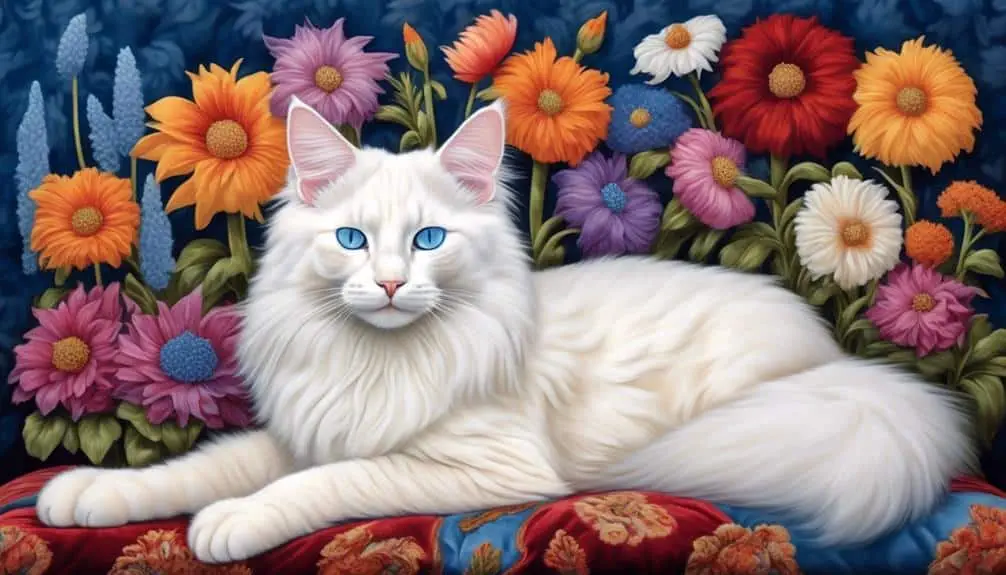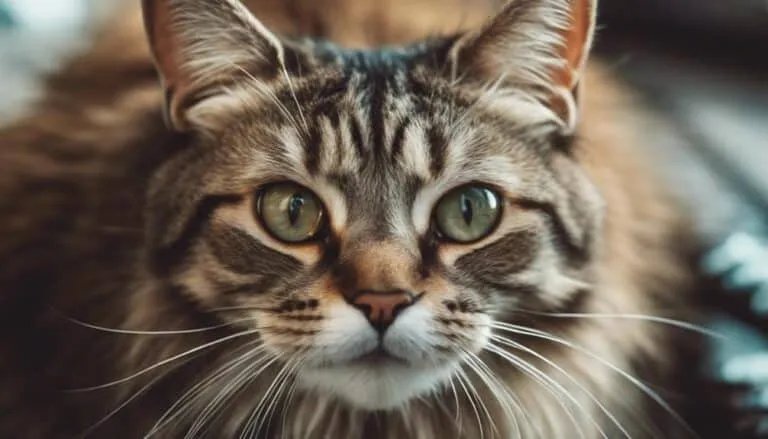The Best Fluffy Pancakes recipe you will fall in love with. Full of tips and tricks to help you make the best pancakes.

Have you ever wondered how some Turkish Angora cats seem to defy the expectations when it comes to their lifespan? These graceful and intelligent felines have a reputation for living longer than the average cat, and there are several factors that contribute to their extended years.
From genetics to proper care, this article will delve into the secrets behind the remarkable longevity of Turkish Angora cats. So, what exactly makes these magnificent creatures stand out and how can you ensure your Turkish Angora lives a long and healthy life?
Let's explore the answers together.
Key Takeaways
- Turkish Angora cats have a longer lifespan of 15 to 20 years, exceeding the average lifespan of cats.
- Outdoor cats, regardless of breed, tend to have shorter lives, typically surviving for 2 to 5 years.
- Factors such as genetics, environment, and healthcare can influence the lifespan of a cat.
- To care for a Turkish Angora cat's long lifespan, provide high-quality food, create an enriching environment, ensure proper healthcare, engage in play, and show affection.
Turkish Angora Cats: A Longer Lifespan
Turkish Angora cats are known for their longer lifespan compared to other cat breeds. This is due to a combination of genetic factors and healthcare practices.
When it comes to genetics, Turkish Angoras have been bred for their robust health and longevity. They've a lower risk of developing certain hereditary conditions, such as deafness and hypertrophic cardiomyopathy, which can affect other breeds.
In terms of healthcare practices, providing regular veterinary check-ups, vaccinations, and a high-quality diet are crucial for promoting a longer lifespan. Additionally, creating an enriching environment that stimulates their mental and physical health, along with showing affection and spending quality time with your Turkish Angora, contributes to their overall well-being.
Factors Affecting Turkish Angora Cat Lifespan
Factors that can influence the lifespan of a Turkish Angora cat include genetics, environment, and healthcare practices.
Genetics play a significant role in determining a cat's overall health and longevity. Choosing a reputable breeder who prioritizes the health of their cats can help ensure that you bring home a kitten with good genetic potential for a long life.
The environment in which your Turkish Angora lives also affects their lifespan. Indoor cats generally live longer than outdoor cats, as they're protected from the dangers of traffic, predators, and infectious diseases. Providing a safe and enriching indoor environment with plenty of mental and physical stimulation is essential.
Tips for Extending Your Turkish Angora's Lifespan
To ensure a long and healthy life for your Turkish Angora cat, implementing certain strategies can significantly extend their lifespan. Here are some tips to help you achieve this:
- Extending lifespan through exercise and mental stimulation:
- Engage your Turkish Angora in regular play sessions to keep them physically active.
- Provide toys that encourage mental stimulation, such as puzzle toys or interactive feeders.
- Consider creating an enriching environment with scratching posts, climbing trees, and perches to fulfill their natural instincts.
- Importance of regular veterinary care:
- Schedule regular check-ups with a veterinarian to monitor your cat's health and detect any potential issues early on.
- Stay up to date with vaccinations to prevent diseases and infections.
- Discuss preventive measures, such as flea and tick control, with your vet to protect your Turkish Angora from parasites.
Feeding and Nutrition for Turkish Angora Cats
Feeding and nutrition play a crucial role in maintaining the health and well-being of your Turkish Angora cat. When it comes to the Turkish Angora cat diet, it's important to meet their nutritional needs to ensure they stay healthy and happy.
As fully grown cats, Turkish Angoras don't have any specific dietary requirements. However, providing them with a high-quality diet that offers all necessary nutrients is essential.
For kittens, it's important to provide a diet specially formulated for their growth and development.
Neutered or spayed indoor cats may benefit from diets that prevent weight gain.
Additionally, older cats with joint conditions like arthritis can benefit from diets containing joint-friendly nutrients.
It's important to consult with your veterinarian to determine the best diet for your Turkish Angora cat and to ensure they receive the necessary nutrients for optimal health.
Creating an Optimal Environment for Turkish Angora Cats
When creating an optimal environment for your Turkish Angora cat, it's important to consider their specific needs and preferences. To ensure their well-being, here are some key factors to keep in mind:
- Environmental enrichment: Provide activities and toys that engage your Turkish Angora's natural curiosity and need for exercise. Scratching posts offer a suitable outlet for their instinct to scratch. High perches and cat shelves will also be appreciated by your feline companion.
- Exercise: Engage your Turkish Angora in play to keep them physically active. Interactive toys, such as feather wands or puzzle toys, can provide mental stimulation as well.
- Mental stimulation: Turkish Angoras are intelligent cats and benefit from mental challenges. Consider providing puzzle feeders or hiding treats around the house to keep them mentally engaged.
Grooming and Healthcare for Turkish Angora Cats
Grooming and healthcare are essential aspects of maintaining the well-being of Turkish Angora cats.
When it comes to grooming, Turkish Angoras have low-maintenance coats that don't easily tangle or mat. Brushing their fur a few times a week is usually sufficient to keep it looking its best. However, during shedding seasons, some Turkish Angoras may require more attention.
Additionally, regular nail trims and dental care are important for their overall health.
In terms of healthcare, Turkish Angoras may be prone to hereditary conditions such as deafness and hypertrophic cardiomyopathy. Therefore, regular veterinary check-ups and screenings are crucial to catch any potential issues early on.
Additional Considerations for Turkish Angora Cat Lifespan
To ensure a long and healthy lifespan for your Turkish Angora cat, it's important to consider various factors beyond grooming and feeding. Taking into account genetic factors and making appropriate lifestyle choices can greatly impact the longevity of your beloved pet. Here are some additional considerations to keep in mind:
Genetic Factors:
- Research the lineage of your Turkish Angora and inquire about any hereditary conditions that may be prevalent in their bloodline.
- Consult with a reputable breeder who prioritizes genetic health and conducts thorough health screenings for their cats.
- Be proactive in monitoring your cat's health and seek veterinary care at the first sign of any potential genetic issues.
Lifestyle Choices:
- Provide a safe and stimulating environment that encourages exercise and mental engagement.
- Minimize stressors in your cat's life to promote overall well-being.
- Consider keeping your Turkish Angora indoors to protect them from outdoor hazards and increase their lifespan.
Conclusion
In conclusion, by providing your Turkish Angora cat with the right care and environment, you can help them defy lifespan expectations and enjoy a long and fulfilling life.
While some may argue that genetics play a significant role in a cat's lifespan, it's important to remember that proper nutrition, environmental enrichment, grooming, and regular veterinary care also contribute to their longevity.
So, take the necessary steps to ensure your Turkish Angora cat lives a happy and healthy life by your side.








